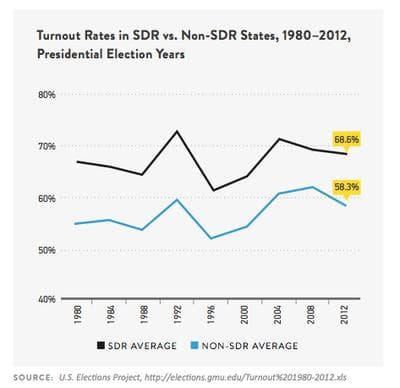Advertisement
On Beacon Hill, Election Reform With A Missing Piece
Last week, a group of about 130 good government advocates bearing brightly colored "#UpdateTheVoteMA" stickers fanned out across the State House to lobby for a broad election reform package.
That the state needs an update is not much disputed; in Massachusetts, a high-tech hub, citizens cannot register to vote online.
The bill would remedy that problem. It would also allow 16-year-olds to "pre-register" — their pending registrations becoming active when they turn 18. And it would permit voters to cast ballots up to two weeks before election day -- putting Massachusetts in line with 32 other states that provide for some form of early, in-person voting.
Taken together, advocates say, the measures amount to a much needed modernization. "We're way behind, in our opinion," said Pam Wilmot, executive director of Common Cause Massachusetts and a principal organizer of last week's lobby day.
But if the ultimate goal of election reform is to boost participation, advocates acknowledge, the bill does not go as far as it might.
Research suggests early voting, for instance, does little to improve turnout — drawing the sort of committed voters likely to cast ballots anyway.
The missing piece, activists say, is a reform that seems to be going nowhere in the Legislature at the moment: election day registration, sometimes called same day registration.
The policy allows voters who start paying attention in the closing weeks of a campaign to show up on election day, register to vote and cast a ballot. Ten states and Washington D.C. have election day registration in place, according to the National Conference of State Legislatures.
Two other states, North Carolina and Ohio, allow voters to register and cast their ballots on the same day during an early voting period.
States with same day registration typically see higher voter turnout.

Of course, same day registration states tend to have other reforms like early voting in place, too.
But researchers at the University of Wisconsin-Madison, working with data from the November 2008 presidential election, teased out the effect of various reforms in a paper presented the following year.
Early voting, they found, actually depressed voter turnout — perhaps by diminishing the excitement of election day. Election day registration, taken in isolation, boosted turnout by six to seven points.
Obstacles
Deborah Shah, executive director of liberal advocacy group Progressive Massachusetts, said some Beacon Hill opponents fear the impact of same day registration on their own careers.
A last-minute "surge of interest and activity" around election day, she said, could lead to an incumbent's ouster.
Election reform advocates said fear of voter fraud may play an even more significant role — even though there is no evidence of same day registration fraud elsewhere in the country.
State Rep. Mike Moran, former co-chairman of the Joint Committee on Election Laws, said resistance from city and town clerks — concerned about added costs and logistical hurdles — has informed his opposition to the idea.
Current state law, which requires citizens to register 20 days in advance of an election, seems less than onerous, he added.
"At this point in time there are many folks that believe we're not really asking a lot by asking [citizens] to register to vote," he said.
Moran said he favors other elements of the election reform agenda — pre-registration for 16-year-olds, for instance, and calls for a random audit of election machines to ensure accuracy.
The House of Representatives passed a bill including those elements last session. And advocates say they are hopeful about the prospects of a reform package this time around.
But it will be reform, they say, with a missing piece.
This program aired on July 23, 2013. The audio for this program is not available.